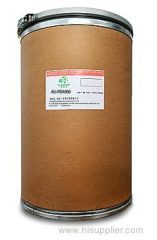
Amylase for Textile Starch Conversion
| Min. Order: | 500 Kilogram |
|---|---|
| Payment Terms: | L/C, T/T |
| Supply Ability: | 50 Metric Tons per Week |
| Place of Origin: | Shandong |
Company Profile
| Location: | Weifang, Shandong, China (Mainland) |
|---|---|
| Business Type: | Manufacturer |
| Main Products: | Waste Water Treatment, Paper Enzyme, Biological Enzyme, Feed Additive, Biological Fertilizer |
Product Detail
| Model No.: | SUKAMY-TX550 |
|---|---|
| Means of Transport: | Ocean, Air, Land |
| Brand Name: | SUKAHAN |
| CAS No.: | 9000-90-2 |
| Appearance: | White Powder |
| Production Capacity: | 50 Metric Tons per Week |
| Packing: | 25kgs per drum or 15kgs per carton |
| Delivery Date: | Within 10 days after payment |
Product Description
Amylase Enzyme Used for Textile Destarch | ||||||||||
Quick Details: | ||||||||||
Brand Name: | SUKAMY | Model: | TX550 | Origin: | China | Usage: | Amylase Enzyme Used for Textile Destarch | |||
Specification: | ||||||||||
1.Appearance: white powder 2.Odor: Slight fermentation odor 3.pH (as is):5.5-7.0,Optimum: 6.0-6.4 4.Temperature:, Optimum: 45oC- 65oC, the product will react quickly at the temperature of 70-85oC but with deactivation quickly. | ||||||||||
Brief Introduction: | SUKAMY-TX550 is an Amylum conversion enzyme derived from the submerged fermentation of Bacillus subtilis. It is mainly used in textile destarch, especially for destarch of silk, chemical fibre and linsey-woolsey. | |||||||||
Packing: | 25kg/drum in bulk | Dosage | 0.5-3g/L.The dosage can be reduced properly for light and thin textile; Better effectiveness can be achieved if used together with penetrant. | |||||||
Advantage: | The benefits of using SUKAMY-TX550 for modifying original starch are easier operation technics and lower cost. With non-pollution, the product can save the chemical product dosage and never damage the fiber. The product can be used at medium temperature which can save energy. | |||||||||
Application&Dosage: | For thick and heavy textile, it is advice that adds non-ionic penetrant atdosage can be reduced properly for light and thin textile; Better effectiveness can be achieved if used together with penetrant.0.5g/L and squeezes the water out before impregnating. Add destarch enzyme in to distributor or machine after pH adjustment. The enzyme dosage is usually 0.5-3g/L and the | |||||||||

